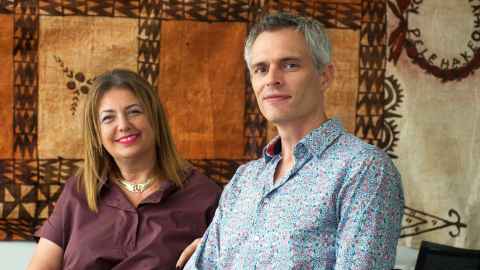New centre to provide critical support for refugees
14 September 2020
A new centre has been established at the University of Auckland to undertake vital work to help refugees who are part of the 7.7 million displaced people in the Asia Pacific region.

The Centre for Asia Pacific Refugee Studies (CAPRS) is based at the Faculty of Education and Social Work. It was co-founded by Associate Professor Jay Marlowe, Dr Gül İnanç and Rez Gardi, thanks to generous seed funding of $456,000 from a Singapore-based philanthropist through his business, Potato Productions.
Jay envisions the centre as being a “recognised platform of research excellence” that responds to challenges refugees face from conflict and climate induced displacement.
Gül is a lecturer at the Nanyang Technological University in Singapore and founder of Opening Universities for Refugees. She says CAPRS will act as a proactive platform for future planning.
“We need to think 50-100 years ahead by imagining utopic and dystopic societies of the future now, in order to create alternative road maps for tomorrow. We are going through a major social transformation as humanity because of the Fourth Industrial Revolution. Another focus area of CAPRS will be the ethical and effective use of digital technologies for the mass displacements of the future.”
Rez was born in a refugee camp in Pakistan and went on to complete a Bachelor of Law (Honours) and a Bachelor of Arts conjoint degree at the University of Auckland. She recently completed her masters at Harvard University focusing on international law, refugee law, and human rights.
She is the founder of Empower, an organisation aimed at addressing the under-representation of refugees in higher education.
In 2017, Rez hosted a forum on improving access to higher education for refugees, which is where the initial idea for the centre was formed. Rez says it is now more important than ever to come up with practical responses to forced displacement.
“From the outset, the centre will be driven by a transformative agenda that places social justice and human rights as core aspects of our work and will empower refugee voices on issues that impact us.
“I am hopeful that the centre will contribute to positive change, inclusion, and social cohesion in New Zealand and the Asia Pacific.”
Jay says a common misconception of refugees is that they are “indelibly vulnerable” and it is misconceptions like these that the centre aims to redress.
“While many people from refugee backgrounds have experienced significant adversity, they also bring incredible strengths and resilience. I have seen this time and time again…Whilst an understanding of vulnerability is important, and what it is that makes people vulnerable in the first place, this focus should not be at the expense of understanding people’s hopes and aspirations that can support positive settlement outcomes and opportunities for belonging and wider social engagement.”
Media enquiries:
Helen Borne | Communications Manager, Alumni Relations and Development
Email: h.borne@auckland.ac.nz